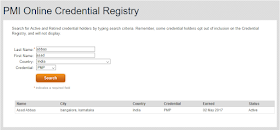By Asad Abbas, PMP
"Good karma matters" this is one mantra which kept me going for my PMP® exam preparation.
I had an aspiration to get the PMP certification, so I made up my mind to complete the certification and started preparing.
"Good karma matters" this is one mantra which kept me going for my PMP® exam preparation.
I had an aspiration to get the PMP certification, so I made up my mind to complete the certification and started preparing.
PMP Coaching Experience
My training began on 18th March, 2017 and I was very fortunate to meet Satya as my coach, who is not only an excellent trainer, a Management Guru but also a good human being. He was always very approachable and at the end of every conversation used to tell me "you will do well”, which boosted my morale and gave me the confidence to prepare and write the exam well.
Own Study
My training got over on 26th March, 2017. The books I used to refer during my preparation were:
- The PMBOK® Guide, 5th Edition by Project Management Institute (PMI)
- I Want To Be A PMP by Satya Narayan Dash
- PMP Exam Prep by Rita Mulcahy
I studied for 5 to 6 hours on week days (Monday to Friday) and 8 to 9 hours over the weekend. Other than the questions given in the book “I Want To Be A PMP”, I also practiced sample questions from the Oliver Lehmann, HeadFirst PMP, Exam central, PMP Exam Prep, Simply learn and PM Exam Simulator.
The questions given in the book “I Want To Be A PMP” were very close to what I saw in the real exam.
I earned my credential on 2nd May, 2017, just over a month of completing my classroom session. The joy of having this credential is to be felt on your own to believe.
How To Prepare
• PMP exam is not about mugging up the Input, Tools and Techniques, and Outputs (ITTOS). The exam stresses on the key concepts. You need to know to how the following key document/tools and techniques flow through the various processes and different knowledge areas:
- Work Performance Information,
- Risk Register,
- Stakeholder Register,
- Project Charter,
- Requirement Documentation,
- Change request,
- Scope Baseline,
- Project Scope Statement,
- Enterprise Environmental Factors,
- Organisational Process Assets,
- Issue Log, and
- Change Log.
• Also understand the subtle differences – the differences among Stakeholder Management, Communication Management and Human Resource Management. This will help in answering many questions correctly.
• Expect mathematical questions on Expected Monetary Value (EMV), Earned Value Management (EVM) and Critical Path Method (CPM).
Main Exam
• Try to reach the examination centre at least an hour early as that will give you enough time to settle down at centre.
• If you are not sure with the answer on any question, then mark the same for review and proceed further. Try to select the most feasible option rather than not selecting anything.
• In the Real Exam, you will get the following important tips during initial tutorial which can help in revisiting the marked questions efficiently:
- You can highlight a text by selecting and right clicking over it. While reviewing the questions later, you can save time just by looking only at the highlighted text.
- Also, if you do a right click by putting the cursor on any given option in answer, then that particular option will get marked as cancelled. During final hour in main exam when your stress will be sky high, visualising the wrong options will help you in concentrating on the remaining choices.
More than all the study
material it was Satya Sir's unwavering support and guidance which helped me in
clearing the examination, along with it the management blog and other pupils’
success stories also motivated me through - thick and thin.
Brief Profile: Asad Abbas, PMP & Certified Scrum Master with 9 years of Experience in service industry. Currently working as Scrum Master with Merck Life Sciences, Bengaluru.
Few Lines By Satya Narayan Dash: Since beginning of this year, I’ve decided to give full credit to the writer, to whom the success story actually belongs. I’m writing a few lines, as Asad fervently requested me to write.
Asad was part of my class in March, 2017. Before coming, he had been preparing for quite some time, but never had the confidence that he could crack the exam. In my class, I remember Asad to be a keen listener, thinks quite analytically on the questions that I asked and was very keen to get the PMP credential.
Post the session, he bought my book and would have a number of clarifications and questions – why am I saying this would be the correct answer, why am I saying these topics are important and so on. Though I was exhausted after my day’s work, his sheer determination moved me. I remember sitting with him as late as 10pm in night to answer his queries, to never panic and to continue working no matter how uphill the task seems to be. In the end, he succeeded - as he says in the beginning of this article “Good Karma Matters”. Indeed, it does.
PMP LIVE LESSONS - Guaranteed Pass:
Book Available for PMP Exam:
Book Available for PMP Exam:
You may also like:



No comments:
Post a Comment
Sign- or Log-in and put your name while asking queries in comments. Any comment is welcome - comments, review or criticism. But off-topic, abusive, defamatory comments will be moderated or may be removed.